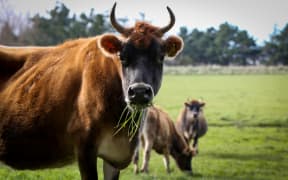Workplace Relations and Safety Minister Michael Woodhouse has defended the Government's decision to classify the most dangerous farming sectors as low risk workplaces.

Michael Woodhouse Photo: RNZ / Alexander Robertson
Under the Health and Safety Reform Bill, dairy, sheep and beef farms, which have high injury rates, are deemed to be low risk while worm farming, rabbit-breeding and mini-golf are considered high risk.
Workplaces in the high risk category will be required to have a health and safety officer.
But Mr Woodhouse said agriculture's low-risk classification did not mean it was a safe sector and he said it was on notice to lift its game.
He said the real question was how they would do that.
"We've introduced a number of initiatives to ensure that they have the best tools to be able to do that," he said.
Mr Woodhouse said the Government was running a five-year programme, Safer Farms, and working to resurrect a quad-bike safety committee.
WorkSafe New Zealand told Mr Woodhouse in a briefing in October 2014 that agriculture was the worst performing industry in the country in terms of health and safety, with 20 deaths in 2013, more than forestry, construction and manufacturing combined. In 2014, there were another 20 deaths of agricultural workers.
In the briefing, WorkSafe said the dairy, beef and sheep industries were the most dangerous sectors of all, with the highest accident and fatality tolls within agriculture.
One thousand workers are severely injured on New Zealand's dairy farms each year. In the last seven years, 53,000 workers have been injured on dairy farms.
Asked whether the government's methodology was flawed in determining risk, Mr Woodhouse said it had looked at data from 2008 to 2013 and indexed it against the size of the industry.
"[Agriculture] employs more New Zealanders than any other industry so when you normalise it out against the size of the workforce, they fell below the thresholds that were set.
"Now, for sheep and beef, they were comfortably below. For dairy it was a much closer run thing, but on balance we let the facts guide us.
"Obviously there's been a little bit of fun around worm farms and mini [golf] but this is a serious examination of how ... all organisations including farming are going to fulfil their obligations under the new law."
Mr Woodhouse earlier said it was possible some industries such as mini-golf, deemed high risk, would be reclassified as low risk following consultation on the bill. It was also possible that industries like quarrying may be reclassified as high risk.
He expected that under the Bill about 75 percent of workers would be able to have a health and safety representative if they wished.




